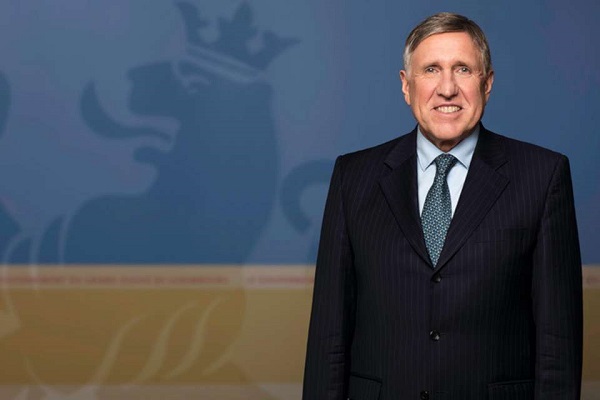 François Bausch, Luxembourg's Deputy Prime Minister, Minister of Defence;
Credit: SIP / Yves Kortum
François Bausch, Luxembourg's Deputy Prime Minister, Minister of Defence;
Credit: SIP / Yves Kortum
On Monday 28 March 2022, Luxembourg's Deputy Prime Minister and Minister of Defence, François Bausch, presented an analysis of the Grand Duchy's defence efforts in the context of the Russia-Ukraine war and reflections and discussions on defence budgets within NATO.
Minister Bausch provided the applicable definitions, as well as the figures and key points of Luxembourg's defence field before explaining the consequences of NATO's budgetary requirements and illustrating the path taken by Luxembourg's defence.
"Following the Russian invasion of Ukraine, many countries announced their intention to increase their defence effort. Luxembourg's defence effort, which was 0.37% of GDP in 2009 and 0.39% in 2013, is currently 0.65% and should reach 0.72% in 2024", he explained: "This growth perfectly illustrates the efforts undertaken in recent years". He specified that according to NATO practice, the defence effort is expressed exclusively as a percentage in relation to GDP: "This way of calculating the defence effort penalises Luxembourg, which, thanks to its flourishing economy, has experienced strong GDP growth over the past 30 years".
"Despite the efforts undertaken by the Directorate of Defence and the army, it must be recognised that Luxembourg is not very well positioned among NATO members if we only consider the relationship between defence spending and GDP", noted Minister Bausch, admitting that Luxembourg is far from the 2% target that NATO wants to achieve.
However, Luxembourg's Defence Minister considered that NATO's quantitative way of linking the defence effort to GDP did not reflect the performance achieved by the Grand Duchy. He explained: "If Luxembourg had the same GDP as Belgium, our current budget of €464 million would give us a defence effort of 1.5%, and in comparison with the Netherlands, the Dutch Defence, with a GDP equivalent to ours, should invest €25 billion in its defence effort instead of the current €11.5 billion to maintain the rate of 1.47%".
While the approach based on GDP does not favour Luxembourg, other indicators illustrate the performance of Luxembourg's defence, according to Minister Bausch. Therefore, the level of Luxembourg investment corresponds to double that required by NATO. The defence effort per Luxembourg soldier is among the highest in NATO with approximately €470,000 per soldier compared to €360,000 per soldier in the United States (US). Moreover, while the Luxembourg defence effort per inhabitant is the equivalent of $594 per capita, the average for NATO member countries (excluding the US) is $521 per capita.
In this context, the Defence Minister deplored the obstinacy of certain NATO members on the 2% threshold. He recalled that the Luxembourg defence budget has increased significantly since 2013, going from less than 0.4% of GDP in 2013 to 0.72% in 2024, i.e. an increase of €382 million. "Despite this remarkable progress, the 2% threshold remains unattainable", insisted Minister Bausch, who calculated that, if Luxembourg wanted to reach 2% by 2024, the budget would have to almost quadruple to reach €1.7 billion.
He also calculated that Luxembourg's Defence would need to acquire an observation satellite (€180 million), a communication satellite (€200 million), a tanker aircraft (€220 million), a transport aircraft (€200 million) and 80 tactical vehicles (€367 million), as well as allocating 7.5% of the state budget to defence (2.1% currently), in order to reach this threshold. "This approach is unrealistic and unachievable and does not take into account the specificity of Luxembourg", said the Deputy Prime Minister.
Minister Bausch reaffirmed the maintenance of Luxembourg's commitments at NATO level and ensured continuous, sustainable and sustained growth, but within the limits of available resources, by focusing in particular on partnerships and providing capabilities that are lacking within NATO. "It is also a question of avoiding an uncontrolled diversification and a dispersion of the means of defence", he recalled.
"[Luxembourg's] defence will study between now and the Madrid NATO summit the opportunities to further increase the defence effort in the limits of available resources and will continue to work towards a broader concept of security", Minister Bausch concluded.








